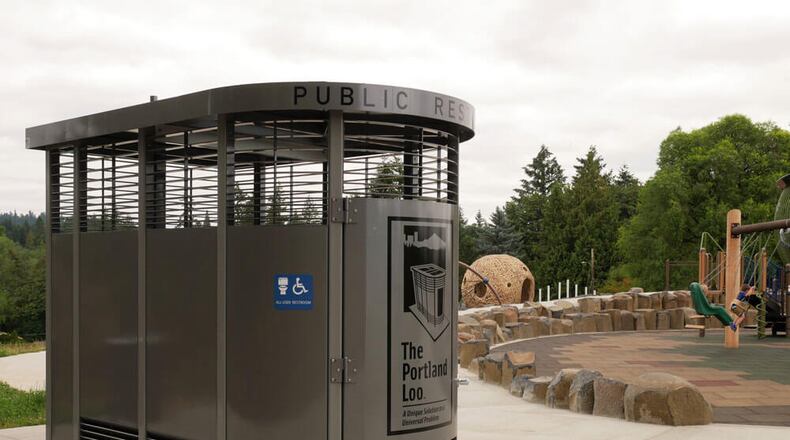Portland Loos’ stainless steel walls are hard to vandalize and easy to clean, and the bathrooms require minimal utilities and they can be operated using solar power or low-level volt power, according to a website for the Portland Loos, which were designed by the city of Portland, Oregon, and are manufactured by a company in that city.
The stand-alone bathrooms are roughly 11 feet long, 6 feet wide and 9 feet tall. They have louver grating at the top and bottom of the units that allow law enforcement to generally see if multiple people are inside.
“It’s a similar effect as with blinds on a window, where you kind of have visibility (straight out), but if you look up or down, you lose that visibility,” said Evan Madden, sales manager for Madden Fabrication, which makes the units.
“The open bottom and top of the restroom allow sight lines and sounds to carry outside the restroom,” says the company website.
Madden said they are “designed to be uncomfortable,” with a limited sense of privacy to deter drug use and other illegal activities from happening inside.
But the company also says the angled louvers “create complete dead space around the top and bottom of the toilet” allowing the person using it privacy from anyone trying to see them on the toilet itself.
Portland Loos also have blue lights to reduce drug users’ ability to locate their veins.
The makers of the Portland Loos say other, more automated restrooms in some cities provide too much privacy that allow for prostitution and drug use.
Dayton police Major Jason Hall said safety and hygiene are ongoing concerns in downtown.
Some people urinate and defecate in public spaces, and these nuisance activities hurt perceptions of the center city, officials said.
More than 200 cities have Portland Loos. Dayton plans to install one unit near City Hall and Courthouse Square at Ludlow and West Third streets, and the other near the Oregon parking garage close to South Jefferson and East Fifth streets, said Hilary Browning, Dayton’s budget and grants supervisor.
The Portland Loos are expected to be installed and operational by fall of this year or possibly in early 2024.
Five Rivers MetroParks has public restrooms downtown at RiverScape MetroPark and the 2nd Street Market., but they are not open 24/7.
“We have issues with drug abuse, criminal trespass and vandalism in the public restrooms at both Island and RiverScape MetroParks,” said Lt. Mark Arendt of the Five Rivers MetroParks Ranger Division. “We have and continue to address these problems with increased patrols and quick responses to complaints from staff when they report problems in progress.”
Free public restrooms also are available at the Dayton Metro Library, the Levitt Pavilion Dayton, City Hall, and the RTA bus hub. But they are only open during certain hours of operation.
Some homeless advocacy groups have praised installation of the Portland Loo bathrooms, but in other cities there has been criticism because of increased police calls to the area.
Dayton has approved spending about $334,000 of its federal Community Development Block Grant money to acquire two Portland Loos. The block grants are part of special COVID relief funding.
Cincinnati has a Portland Loo at Smale Riverfront Park, and Columbus is installing multiple units. New York City and Philadelphia are considering installing Portland Loos, which cost a fraction of the price of building traditional bathrooms, supporters say.
About the Author



